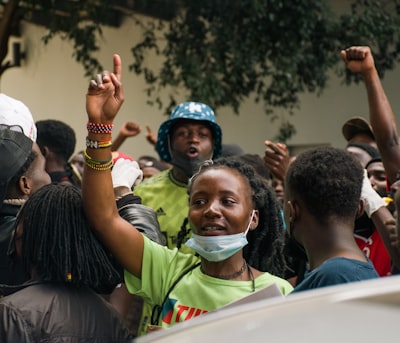Togo Protests 2025: Understanding the Roots of Unrest After Rapper Aamron’s Arrest
Togo, a small West African nation, has recently seen a surge of political protests, heightened dissent, and international scrutiny. The arrest of the popular rapper Aamron has ignited widespread outrage, inspiring young people to take to the streets and demand change from a government perceived as unresponsive and authoritarian. What lies beneath these headlines, and what does it mean for Togo’s future? Let’s break down the key issues, emerging trends, and the deeper reasons fueling this political crisis.
Why Did Aamron’s Arrest Spark Mass Protests in Togo?
When Tchala Essowè Narcisse, better known as Aamron, was detained in May without warrant or official charges, many saw it as just the latest in a long line of crackdowns on dissenting voices. However, Aamron’s case resonated across Togo for several reasons:
- Symbol of Youth Dissent: As a TikTok star and outspoken musician, Aamron vocalized frustrations about corruption, economic pressures, and lack of opportunity.
- Growing Social Media Activism: His lyrics – spread virally online – gave younger Togolese citizens a rallying cry against the Gnassingbé family’s decades-long rule.
- Harsh Repression: Reports of torture, arbitrary detention, and the targeting of activists sent a chilling message, sparking further anger.
The Gnassingbé Dynasty: How Long Has One Family Ruled Togo?
Many are asking, "How long has Faure Gnassingbé ruled Togo… and why?" The answer reveals much about the current unrest:
- Dynastic Rule Since 1967: The Gnassingbé family, starting with Faure’s father, Gnassingbé Eyadéma, has held almost unbroken power for nearly 60 years.
- No Real Alternation of Power: Despite global trends toward democracy, Togo remains one of Africa’s most enduring political dynasties.
- Constitutional Changes: In 2024, a controversial constitutional amendment further entrenched Faure’s position by eliminating presidential term limits and direct elections – moves many see as a "soft coup."
What Do Young People Want? The Search for Political and Economic Freedom
Online interest in phrases like "why are there protests in Togo" or "Togo youth movement" highlight root causes beyond the headlines:
- Lack of Jobs and Opportunity: Togo patients one of Africa’s highest rates of youth unemployment; the cost of living is rising.
- Corruption, Nepotism, and State Violence: Repeated allegations of repression and mismanagement have fueled calls for reform – and accountability.
- Demand for Human Rights: Civil society groups, student unions, and diaspora organizations want an end to arbitrary arrests, torture, and restrictions on free speech.
International Response: Sanctions, Silence, or Solidarity?
The unrest has prompted calls for a stronger international response, raising questions such as, "What has the UN or ECOWAS said about Togo? Should there be sanctions?"
- Muted Official Reaction: While ECOWAS urged dialogue, global headlines remain dominated by crises elsewhere, overshadowing Togo’s plight.
- Growing Diaspora Pressure: Togolese abroad are ramping up advocacy, demanding sanctions and diplomatic scrutiny.
- Role of Human Rights Watchdogs: Reports from Amnesty International underline the urgency of abuses many fear will be ignored.
How Social Media is Changing Protest in Togo
Social media has become a crucial battleground for political change in Togo:
- Viral Lyrics, Real Protest: Aamron’s music and message have mobilized young people in ways traditional politicians cannot.
- Hashtags and Online Mobilization: Movements like #TogoLibre ("Free Togo") give digital voice to a generation not content with the status quo.
Key Takeaways: What’s Next for Togo?
- The arrest of figures like Aamron signals rising authoritarianism–and emboldens protests.
- Youth dissatisfaction, economic hardship, and demands for democracy drive ongoing unrest.
- International attention and advocacy are critical to supporting human rights and a future for Togo beyond dynastic rule.
FAQs on Togo’s Political Crisis
Q: Why is Togo protesting now? A: The recent arrest of rapper Aamron catalyzed grievances over repression, corruption, and constitutional changes eliminating term limits.
Q: Who is Faure Gnassingbé? A: Togo’s president, in power since 2005, son of former president Gnassingbé Eyadéma, and now further entrenched by controversial legal reforms.
Q: What impact is social media having? A: Social platforms have amplified dissent, galvanized youths, and helped protests go viral, bypassing state media controls.
Q: How can the global community support Togolese democracy? A: Call for independent investigations, support civil society, and urge governments to pressure the regime for reforms.
For those following African politics, emerging protest movements, or the global struggle for democracy and human rights, Togo’s current crisis is a crucial story. Its outcome may set precedents for authoritarian responses—and youth-led activism—across the continent.
Further Reading:

Comments
No comments yet. Be the first to comment!